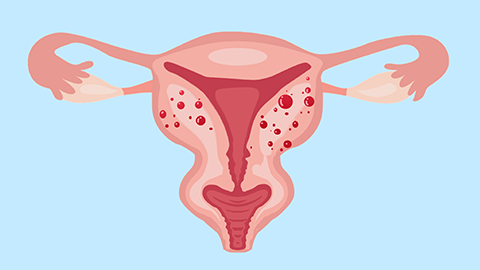What causes endometriosis?
Generally, endometriosis may be caused by retrograde menstruation, endocrine disorders, genetic factors, chronic pelvic inflammatory disease, adenomyosis, and other factors. If discomfort occurs, it is recommended to seek medical attention promptly. Detailed analysis is as follows:
1. Retrograde Menstruation
During menstruation, some menstrual blood mixed with endometrial fragments may flow backward through the fallopian tubes into the pelvic cavity. These fragments can implant and grow within the pelvic cavity, potentially causing endometriosis. Vigorous exercise, excessive fatigue, and tub bathing should be avoided during menstruation to reduce the likelihood of retrograde menstruation. Maintaining good menstrual hygiene, timely changing of sanitary products, and keeping the external genital area clean are important. If severe dysmenorrhea or other discomfort occurs, rest promptly and monitor symptoms, seeking medical evaluation when necessary.
2. Endocrine Disorders
Elevated estrogen levels or relatively insufficient progesterone levels in the body can stimulate the growth of displaced endometrial tissue, worsening symptoms of endometriosis. This may be accompanied by menstrual irregularities. Maintaining a regular sleep-wake cycle, avoiding staying up late, and ensuring adequate sleep can help maintain endocrine stability. A balanced diet with reduced intake of spicy and irritating foods, along with increased consumption of foods rich in vitamins and proteins, is recommended. Learning to manage emotions and avoiding prolonged states of tension and anxiety through activities like listening to music or walking can help relieve stress.

3. Genetic Factors
Women with a family history of endometriosis have a significantly increased risk of developing the condition. Genetic factors may reduce the body's ability to immunologically recognize and clear displaced endometrial tissue. These women should remain vigilant and undergo regular gynecological examinations, especially if experiencing symptoms such as dysmenorrhea or menstrual abnormalities, seeking medical attention promptly. Developing good lifestyle habits and enhancing physical immunity can help reduce the risk of disease. If diagnosed,积极配合医生治疗 (actively cooperate with medical treatment) and undergo regular follow-up examinations.
4. Chronic Pelvic Inflammatory Disease
Chronic pelvic inflammation can cause adhesions and congestion of pelvic tissues, altering the pelvic environment and increasing the likelihood of endometrial fragments implanting within the pelvic cavity, thereby triggering endometriosis. Symptoms often include a sensation of pressure or pain in the lower abdomen. Medications such as cefixime dispersible tablets, metronidazole tablets, and levofloxacin hydrochloride capsules should be used under medical guidance to control the progression of inflammation. Practicing good personal hygiene and avoiding unclean sexual practices can reduce the risk of pelvic infections. If inflammation recurs frequently, timely medical consultation is necessary to adjust the treatment plan, and physical therapy may be combined to improve pelvic blood circulation when needed.
5. Adenomyosis
In patients with adenomyosis, endometrial tissue invades the uterine muscle layer, potentially affecting normal uterine function and increasing the likelihood of endometrial tissue displacement to other pelvic areas. Symptoms may include increased menstrual flow and worsening dysmenorrhea. Under medical guidance, medications such as dydrogesterone tablets, leuprolide acetate microspheres for injection, and tri烯炔诺酮 capsules (gestrinone capsules) can be used to alleviate symptoms and inhibit the growth of displaced endometrial tissue. Adequate rest and avoiding excessive fatigue are important, particularly during menstruation when保暖 (keeping warm) and reducing strenuous activities are advised. If medication proves ineffective, other treatment options should be considered under medical supervision, along with regular follow-up to monitor disease progression.
In daily life, maintaining good personal hygiene habits to prevent pelvic infections, engaging in appropriate physical exercise to enhance physical fitness, and strictly following medical instructions for medication use while ensuring proper storage to guarantee medication safety are essential.









